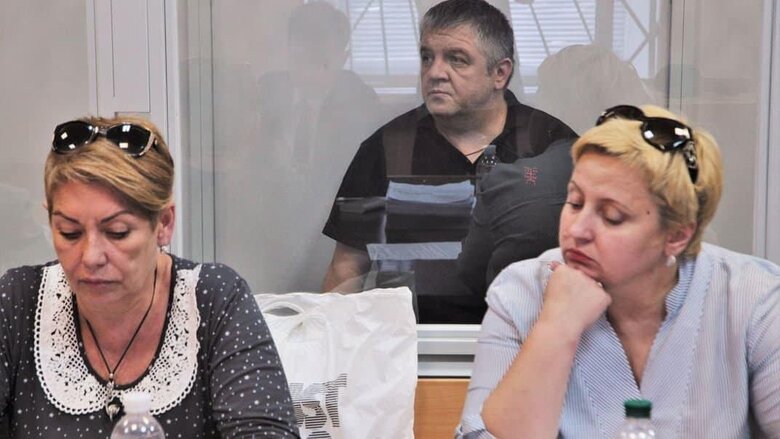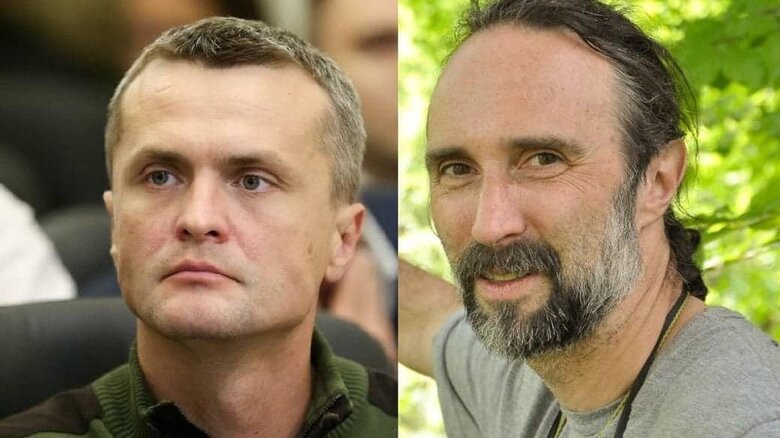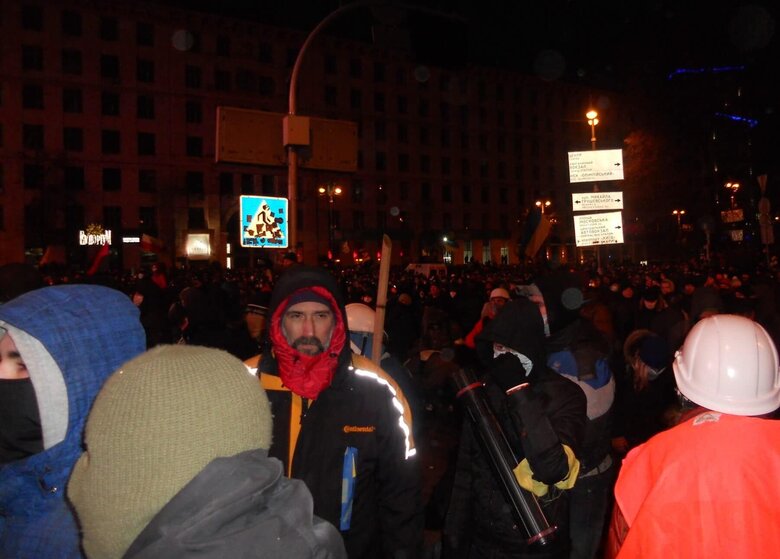Prosecutor Yuliia Malashych: "We filed appeal as we insist that Verbytskyi was actually murdered"
Oleksandr Volkov, who was accused of involvement in the abduction, torture and murder of Yurii Verbytskyi, as well as the abduction and torture of Ihor Lutsenko during the Revolution of Dignity, has been released from custody.
This decision was made by the panel of the Kyiv Court of Appeal, which dismissed the appeals of the defence counsels, the prosecutor, and the victim's representative. This was reported by the Advocates' Advisory Group and Ihor Lutsenko himself.
The judges also released him from serving his sentences under a number of articles due to the expiry of the statute of limitations for bringing him to justice.
To find out whether the prosecution will file a cassation appeal, we spoke to Yuliia Malashych, a prosecutor at the Prosecutor General's Office who supported the state prosecution in this case.
-Commenting to our publication on the decision of the Kyiv Court of Appeal, according to which Oleksandr Volkov was released from custody, Ihor Lutsenko's lawyer Liubov Kryhan explained that only those who filed appeals can appeal against it in cassational instance. You represented the public prosecution in this case. Do you plan to file a cassation appeal with the Supreme Court?
- First of all, I would like to remind you that according to the decision of the Boryspil court, Volkov was sentenced to 9 years in prison, and he was actually held in custody for 7 years. When the proceedings were considered in the first instance, Volkov was charged with kidnapping, torture, obstruction of peaceful protests committed by him as a member of a criminal organisation, and, accordingly, participation in a criminal organisation. As well as the murder of Yurii Verbytskyi. Following the trial, the Boryspil City District Court found that Volkov committed the crimes as part of an organised group, not a criminal organisation. Therefore, he justified Volkov under Article 255 of the Criminal Code. And the murder was reclassified as leaving a person in danger, which led to grave consequences. And this is no longer Article 115 of the Criminal Code, but part 2 of Article 135.
We filed an appeal, categorically disagreeing with this decision, as we insist that Verbytskyi was actually murdered. Accordingly, we argued that this was an organisation of accomplices whose actions extended not only to the episode of Lutsenko's abduction and torture, as well as Verbytskyi's murder, but also to another series of crimes committed by its members or financed by its leaders.
The defence also filed an appeal.
Following the trial on appeal, the verdict of the Boryspil City District Court was upheld. At the same time, the defence's demands for Volkov's full acquittal were rejected.
Although the "Savchenko law" was no longer in force at the time of his arrest, the Grand Chamber of the Supreme Court ruled that the law applies to all crimes committed before its cancellation, and even to crimes committed before its adoption. Accordingly, one day of pre-trial detention is counted as two days of imprisonment when the court calculates the sentence.
In the court of first instance, we asked for thirteen years' imprisonment, taking into account Volkov's role and the extent of his involvement in the torture and murder.
The trial in the appellate instance was extremely lengthy. There were cases when hearings were scheduled but did not take place for various objective and subjective reasons, in particular, we had more than six months since the beginning of the full-scale invasion.
I have not seen the full text of the decision, it will be available only on Monday, and I am looking forward to it. Therefore, unfortunately, I cannot have a long discussion, because I do not know what positions, principles, arguments and grounds the court of appeal proceeded from when dismissing the appeals. But I can speak to the merits of the case and on these grounds I can state that I will write a cassation appeal and definitely appeal to the Supreme Court. Firstly, I categorically disagree with the fact that Yurii Verbytskyi was left in danger. This directly contradicts the circumstances in which he was left. A man unconscious, with numerous injuries, in a motionless state, because he was taken deep into the forest at 10 degrees below zero without any outerwear and left there. Some people are killed with a gun, others with a knife. Verbytskyi was killed by cold and bodily harm. And clearly realizing that all these actions would lead to death. It was not some frivolous calculation that he might survive. It was a cold calculation on the real consequence in the form of the victim's death. And this directly excludes any possibility of considering the crime under Article 135 of the Criminal Code - leaving a person in danger.
By the way, I would like to draw your attention to the fact that the European Court of Human Rights, in upholding the complaints of Verbytskyi and Lutsenko against Ukraine for these crimes, also stated that Verbytskyi was unlawfully deprived of his life. In other words, the ECHR had enough arguments and circumstances to establish the fact of Verbytskyi's murder, although it considered a much smaller amount of evidence. Unfortunately, our national courts lacked these arguments.
Perhaps an outdated vision of the killing process also played a role. We are used to killing with anything but frost.
And the second point is that this organisation of accomplices consisted of about 20 people. These are the people who have been identified and are currently being tried, including in absentia. They were centrally funded, the organisation had its own specific hierarchy, which extended to various areas, from business to crime. And it is impossible to say that it was just a bunch of people who just sat around and decided to kidnap other people. In our opinion, the investigation has gathered sufficient evidence, which was also examined by the court, that the convict was a member of this organisation and committed crimes.
And the third point why the cassation appeal in this case is extremely important is that we have an exceptional legal problem with the application of Article 49 of the Criminal Code.
The statute of limitations has expired for the articles that the appellate court upheld by the Boryspil City District Court, namely Articles 127(2), 146(3), and 135(2). Accordingly, according to the Supreme Court's practice, the appellate court in this case should release the person from serving his sentence. This is what it did. But this is legal nonsense. Volkov was released from serving the sentence he had already served by a court decision. Because you can't release a person from a sentence he has already served. This can create a lot of legal problems.
This problem is obvious and needs to be addressed.
- What should we do about it now?
- So we will ask the Supreme Court. Let's hope that the relevant panel of the Criminal Court of Cassation, taking into account our initiative, will forward the relevant cassation appeal to the Grand Chamber to explain what legal mechanism is in place and how to deal with this situation.
- Will it all be in one cassation appeal or different ones?
- One. By law, we have three months to appeal. We will have to do a lot of work, but this legal problem must be resolved.
- You said that the Verbytskyi-Lutsenko case involved about 20 people involved in a criminal organisation. Where are they now?
- If we do not count Volkov, five more are in Ukraine. Two of them have court verdicts, and one case was closed for reasons other than exoneration due to the statute of limitations. Two more are still in court. The rest are being tried in absentia. These are 11 more people who fled to Russia. Among them are the leaders of the criminal organisation.
- In other words, the prosecution in all these cases insists that it is a criminal organisation?
- Yes, they are charged with participation in a criminal organisation, and I will fight to the last to keep it that way.
- What else are they charged with besides the episodes relating to Lutsenko and Verbytskyi?
- An episode of abduction and torture of a civilian who was perceived as a protester. These are the events at the Petrivka metro station (now renamed Pochaina - author's note), where Oplot, which was funded by this criminal organisation, was involved. Some of the members of the criminal organisation are also charged with the events that took place on 18-19 February at the intersection of Volodymyrska and Velyka Zhytomyrska streets, when Veremii was killed and 9 people were injured. Some of them are also accused of collaborative activities committed after the full-scale invasion. They are leaders in the pseudo-occupation authorities of the terrorist country.
- I understand that the trial in the Boryspil City District Court is not the longest in comparison to other cases concerning the Maidan events. Am I wrong?
- Although I categorically disagree with the decision of the Boryspil City District Court, I must note that the trial was organised within a reasonable time, the court hearings sometimes lasted until late in the evening, and there were no situations, as there are in many cases, when a hearing is scheduled once a month, and even on that day the judge takes a day off, goes into a conference room or takes a leave of absence at his own expense.
- Is there a certain tendency to hear Maidan cases for so long? Are they not a priority for the judges, do they link them to politics, or are they deliberately delaying the proceedings for some reason when they take such weekends and holidays?
- I am a categorical opponent of the fact that the cases of crimes committed during the Maidan events have any political overtones because there cannot be any political motive in the murders, illegal abductions, torture, illegal deprivation of liberty of people. Because any of us could have been in the position of these victims, and I am sure that none of us would have mentioned a political motive in such cases. But some defenders have been spreading this narrative. And perhaps this has its consequences. I don't know. But there are indeed great difficulties in considering simple cases objectively. For example, when there are two episodes in the case, and it has not been heard since 2016. This trend of hearing cases is abnormal. This is not a case involving several hundred volumes, as it was in the Berkut case. There, the process really required a long trial.
In addition, there are many cases that were closed this year due to the statute of limitations only because they did not want to organise a trial or judges tolerated improper procedural behaviour of the defence. For example, I had a case where the defendant and the defence counsel took turns being sick for a whole year. And as soon as the statute of limitations expired, everyone recovered sharply and demanded that their motions to close the proceedings be considered as soon as possible.
- In this way, most cases can be closed over time, and no one will be held accountable for the crimes committed against the participants in the Maidan events. This is very dangerous.
- Yes, this is a very dangerous trend that has been ten years in the making. All this time, we have been going to the Verkhovna Rada committees, explaining the need to amend the procedural legislation. I was among these people, wrote more than one draft law, defended them, and gave examples. My colleagues and I also spoke publicly on this issue. In other, for ten years we have been talking about the need to amend the procedural legislation, explaining that the statute of limitations in the Maidan cases will soon come to an end and we will all throw up our hands because the accused will be released from serving their sentences or from liability.
- In other words, the more time passes, the more defendants in the 'Maidan cases' may be released and will have a chance to sue the state for compensation?
- Yes. Currently, some lawyers have introduced a "great business" where the defendant's counsel disrupts court hearings - allegedly sick, having other cases, preparing motions for 4 months or making up something else. The trial turns into a long farce. And then they go to the ECHR and say that the state of Ukraine should pay the accused money because the trial is taking too long. And many lawyers create such a situation to make money on these compensations. And every year, Ukraine pays not even hundreds of thousands, but tens of millions in compensation for the fact that it cannot properly ensure that the regulations are in place to ensure that trials take place within a reasonable time.
- I heard about this problem from other prosecutors in these cases for several years and thought it had already been solved.
- No, it is not. I will say more - no one wants to solve it. It can be solved by amending the procedural legislation. Providing judges with a wider range of tools to influence improper procedural behaviour, introducing the institution of abuse of procedural rights with appropriate consequences. It is also important to eradicate many bureaucratic issues that delay or make the trial too long, unreasonably, without pursuing the goal of making a final decision. It's just process for the sake of process.
- The deputies did not support such initiatives, did I understand you correctly?
- There were several draft laws that passed the first reading but did not reach the second reading.
Tetiana Bodnia, Censor.NET



